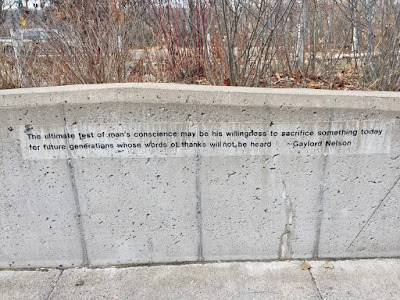 |
| Winter snowstorm, goldfinches
Photo by J. Harrington
|
For the past couple of years, particularly since November 2016, we've been fighting a deepening sense of cynicism, but, despite increasing evidence that our cynicism was well founded, we haven't been willing to accept it as a basis for most of our actions. We weren't sure why. Today, while checking quotations from books that we haven't read for years, perhaps decades (you knew we're that old), we rediscovered a major source of why we won't let cynicism win. It feels like an example of having internalized something to the extent that we lost track of several of the sources. Here's the one we rediscovered today:
What are the elements of the sustainability revolution? They go beyond good information, new technologies, democratic participation, and sound policy. The authors close their book with a description of five "tools" that are generally not mentioned in most supposedly "serious" studies of what we must do: visioning, networking, truth-telling, learning, and – as they explain in this excerpt – loving.
One is not allowed in the modern culture to speak about love, except in the most romantic and trivial sense of the world. Anyone who calls upon the capacity of people to practice brotherly and sisterly love is more likely to be ridiculed than to be taken seriously. The deepest difference between optimists and pessimists is their position in the debate about whether human beings are able to operate collectively from a basis of love. In a society that systematically develops in people their individualism, their competitiveness, and their cynicism, the pessimists are the vast majority.
That pessimism is the single greatest problem of the current social system, we think, and the deepest cause of unsustainability. A culture that cannot believe in, discuss, and develop the best human qualities is one that suffers from a tragic distortion of information. "How good a society does human nature permit?" asked psychologist Abraham Maslow. "How good a human nature does society permit?"
… It is difficult to speak of or to practice love, friendship, generosity, understanding, or solidarity within a system whose rules, goals, and information streams are geared for lesser human qualities. But we try, and we urge you to try. Be patient with yourself and others as you and they confront the difficulty of a changing world. Understand and empathize with inevitable resistance; there is some resistance, some clinging to the ways of unsustainability, within each of us. Include everyone in the new world. Everyone will be needed. Seek out and trust in the best human instincts in yourself and in everyone. Listen to the cynicism around you and pity those who believe it, but don’t believe it yourself.
– Donella H. Meadows, Dennis L. Meadows, and Jørgen Randers
 |
“The ultimate test of man's conscience may be his willingness to sacrifice something today for future generations whose words of thanks will not be heard.” ― Gaylord Nelson
Photo by J. Harrington
|
The Meadows, Meadows and Randers quotation is from the book Beyond the Limits, an update to the Limits to Growth by the same authors. The "Limits" and "Beyond" book publication dates bracket James Hansen's congressional testimony regarding greenhouse gases. Meadows, Meadows, Randers and Hansen have been proven prescient enough to warrant being taken very, very seriously. But, note that their scientific prowess is heavily tempered by a strong streak of the humanities. [See, e.g., the quote above from Meadows et. al.] Some of Hansen's humanistic optimism can be found in his preface to Sophie's Planet, a series of letters to his granddaughter, to be published in book form on April 21st, 2020. (The "preface" link is to a PDF of the actual preface.)
The Average Mother
The average mother loses 700 hours of sleep in the first year of
her child’s life; or, what that first year taught me about America. Most of us favor one side when we walk. As we tire, we lean into that side and stop moving in a straight line— so it takes longer to get anywhere, let alone home. In wilderness conditions, where people don’t know the terrain, a tired person might end up leaning so far into one side they’ll walk in a circle rather than straight ahead. It can kill you, such leaning —and it can get you killed. Rest helps. I told my husband, I walked in a circle in my mind but you came out okay. Initially, he asked me to clarify, but then he let it go. Who wrote that first If You Lived Here You’d Be Home by Now sign? It seems I’m going to have to move. I am tired and also sick of helping other people in lieu of helping myself. Rest now. It’s really not that bad: we’re in the home stretch. That’s the mind of a parent. Relentless optimism in the face of sheer panic and exhaustion.
********************************************
Thanks for visiting. Come again when you can.
Please be kind to each other while you can.
No comments:
Post a Comment